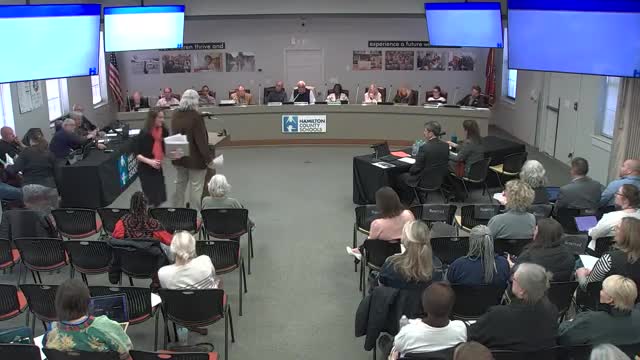Hamilton County reviews charter-authorizer responsibilities; two letters of intent filed for new charters
Get AI-powered insights, summaries, and transcripts
Subscribe
Summary
District staff reviewed charter-authorizing duties, the state performance framework and application timelines; two letters of intent (Little Kings and Queens Charter Academy and Tennessee Wildflower Public Charter) were announced, with application deadlines and review rules explained to the board.
Hamilton County School District officials reviewed the district’s role as a charter authorizer at a board meeting (date not specified), explaining annual evaluation processes, performance frameworks, timelines for application review and next steps for two prospective charter applicants that filed letters of intent.
Jim Bowles, director of Access and School Choice, introduced the charter office overview and said Fani Moore, the district’s new charter coordinator, would lead the presentation on application rules and authorizer responsibilities. Moore summarized the state-required performance framework Hamilton County uses to evaluate charters in three domains: academic performance and school culture, financial performance, and organizational performance. She said the district conducts two site visits each year and gathers input from multiple departments to produce annual authorizer reporting to the Tennessee Department of Education.
Moore reviewed recent authorizer evaluations of the district. She said Hamilton County received a 1.83 out of 4 in 2021 (approaching satisfactory), which required a corrective-action plan, and a satisfactory rating of 2.39 out of 4 in 2023 after the district strengthened dedicated staffing and completed required updates. She said the state’s model framework is being updated and the district will update its own framework to match.
Application process and timelines: Moore explained the application cycle timeline: letters of intent were due Dec. 3; full applications (the TDOE online application) must be submitted by 11:59 p.m. on Feb. 1 and the district then has 90 calendar days to approve or deny an application. If the board fails to act within that 90-day window, the application is deemed approved. If denied, applicants receive written feedback and may update and resubmit; the board then has 60 days to act on a resubmission. An applicant denied by the district may appeal to the Tennessee Public Charter School Commission within 10 days; the commission issues a decision within 75 days.
Two letters of intent: Moore said the district had received two letters of intent. Little Kings and Queens Charter Academy proposed a Montessori K–1 model with a projected capacity of 25 students and a proposed East Ridge location, targeting the 2025–26 school year for opening. Tennessee Wildflower Public Charter (sponsored by the Tennessee Wild Flower Foundation) proposed a Montessori pre-K4 model at full capacity of 108 students, with no specific facility identified and a proposed opening in the 2026–27 school year.
Moore said the district collects conflict-of-interest forms from board members when letters of intent are filed and distributes authorizer resources and training opportunities. She also noted the district charges an application fee for applicants, but the precise dollar amount in the presentation was unclear in the transcript and should be confirmed with the charter office.
Why it matters: Charter applications and renewals affect local school enrollment patterns, facilities use and district finances. The board, acting as authorizer, must meet strict timelines and procedural requirements under state law.
What’s next: The district review committee will evaluate any submitted applications using the state rubric and deliver a recommendation to the board. The board must vote within the timelines described. The district gave board members resources for training and said staff is available for follow-up questions.
